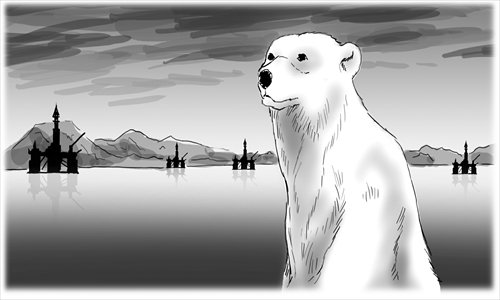India reaches north for energy options as Arctic ice slowly melts away

Illustration: Liu Rui/GT
Like other countries, India is eyeing the Arctic's untapped energy resources as a possible solution to meet its own power needs.
In 2013, the Arctic sea ice minimum extent was the sixth lowest on record and the downward trend continues. Predictions by various models say that the summer-time Arctic sea ice could disappear completely by 2050, and possibly decades sooner.
The five Arctic littoral countries, Russia, the US, Denmark, Canada and Norway, have been competing over territorial claims in the region. While some maintain that like Antarctica, the Arctic should not be exploited for any activity save for scientific expeditions due to its environmental vulnerabilities, others contend that the resources of the Arctic region belong to the entire world and not just the littoral countries.
India's first Arctic expedition was held in 2007 and it established its own scientific research station at Ny-Alesund, Spitzbergen.
India is planning to acquire an icebreaker for scientific and business expeditions in the polar regions.
India has also entered into memorandums of understanding with the Norwegian Polar Research Institute and Kings Bay, a Norwegian government-owned company, for cooperation in science, logistics and infrastructure facilities.
However, India needs to formulate a robust and lucid Arctic strategy as its interests in the region are not just scientific and environmental, but also commercial and strategic.
Scientific expeditions in the Arctic could help India to gauge the effects of global warming on the Himalayan glaciers, sea-level and the Indian monsoon.
Strategically, India has three options. It could push for an Arctic body under the auspices of the UN to monitor and prevent ecological damage caused by activities such as resource exploration and extraction in the Arctic. Human activities in the Arctic could intensify the effects of climate change not just in the region but across the globe.
It could also strengthen ties with Russia, one of the pivotal players in the Arctic region. The ONGC Videsh Limited (OVL) has been showing keen interest in acquiring stakes in Russia's Arctic region, and in 2013, Russia's Rosneft offered the OVL a stake in two exploration blocks in the northern part of the Sea of Okhotsk in eastern Russia.
India could also utilize its expertise in the safe extraction of gas hydrates from offshore deposits that could become unstable as the oceans warm.
Another option is to promote Russia-India-China (RIC) trilateral cooperation, which could be a prospective platform for joint exploration of the Arctic for resources.
Sino-Russian cooperation in the Arctic has taken giant leaps over the years, especially in the energy sector. China National Petroleum Corporation has signed deals with Russia's Rosneft to explore oil and gas fields in the Arctic.
India and China should exploit Russian companies' lack of experience in offshore projects at senior level when drilling in the Russian Arctic. India already has experience in collaborating with the Russians in Siberia, such as in the Sakhalin energy field.
Russia's experience has so far been marred by poor environmental, health and safety track records. Russia's resources could fulfil the requirements of energy-deficient India and China. The resources in this region are enough for both countries to acquire without competing against other each.
One of the major objectives of the RIC is multipolarization and democratization of international politics. China-Indian collaboration in the Arctic would strengthen Asia's position in international politics.
The author is a geopolitical and environmental security analyst based in Kerala, India. dhanasreej@gmail.com